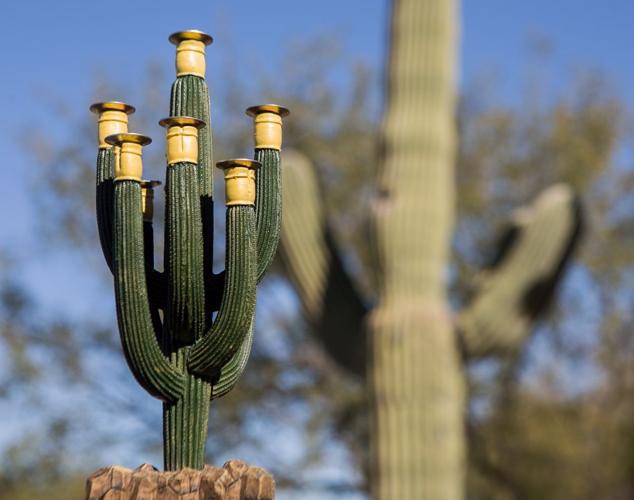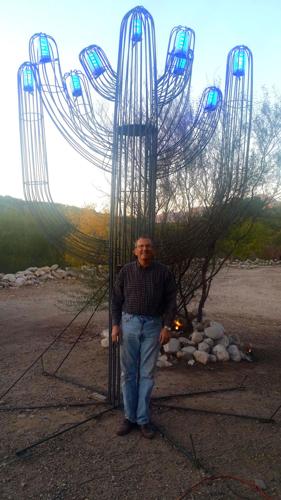They call it the Sonora Menorah.
On an exploratory drive through their new hometown, Eliot Kohen and Marilyn “Mickii” Cohen were inspired by one of Tucson’s saguaro cacti. This one resembled a menorah.
They had just moved to Tucson from Santa Fe that year, 2012, and found themselves enchanted with the saguaros dotting the landscape.
“I get wildly enthusiastic about them,” Mickii, 69, said. “When we first moved here, I was running around trying to name them all.”
Eliot, 72, sat down soon after that drive and began sketching a design. The final product would be a menorah that resembles a saguaro cactus. They sell for $26.97 online or about $45 in some stores.
Eliot said he grew up as a nominal Jew but both he and Mickii have vivid memories of celebrating Hanukkah with their families. The eight-day Jewish Festival of Lights begins at sunset Sunday, Dec. 6, and ends Monday, Dec. 14. It commemorates the rededication of the Second Temple in Jerusalem in second century B.C.E.
“I remember getting the menorah out and meticulously cleaning the handle for any residual wax and deciding where it was going to go,” Mickii said.
For her, the continuity of the tradition was particularly special — with her father in the U.S. Air Force, she attended 13 schools before college.
“I remember the excitement of lighting that first candle, and my mom always made potato pancakes,” she said. “It was all of that for me — that smell and the sizzle of the frying pan.”
Mickii’s mother lived with the couple in New Mexico during the last eight years of her life. Still, she made latkes for her daughter and her husband.
“She was very spiritual and very Jewish in the nicest possible way,” Eliot said. “She taught me as much about Judaism as I think I ever knew.”
This will be the couple’s first year celebrating with the Sonora Menorah.
Because the arms vary in height, it is not a kosher menorah, said Sarah Chen, the associate director of the Jewish Federation of Southern Arizona Northwest Division. The office sells the menorahs.
The process from idea to manufactured product took Eliot and Mickii almost three years. The menorahs finally arrived in February 2015.
“Neither of us is a designer or an artist,” Eliot said.
Mickii chimed in.
“And I would add that Eliot has never had anything to do with manufacturing,” she said.
Before retiring, Eliot worked in advertising, and Mickii was a copywriter.
They invested more than $20,000 in Sonora Menorah, but even if they don’t make a profit, the project has been worthwhile, Eliot said. When stock runs out, they are not sure if they will do this again.
“We came here to retire and take it easy and put our feet up and watch TV and go for walks,” Eliot said, laughing. “And now we’re packing and shipping.”
After Eliot’s initial sketch, they had a 3D file of the menorah made using CAD/CAM software and then took it to a 3D printer. At each step of the way, they fussed with and tweaked their project. Finally, they sent it to a manufacturer.
They had 2,000 menorahs made and had half packaged to emphasize the product’s Jewish heritage and the other half packaged to appeal more to the menorah’s Southwestern flair. The latter set includes information about the menorah in English and Spanish.
Eliot and his wife also sell the menorahs in several shops around Tucson, including at the Congregation Anshei Israel gift shop at 5550 E. Fifth St.
“It’s Southwestern and it’s Judaic, and we get lots of out-of-towners during the year who want to combine the two,” said Phyllis Becker, the chairwoman of the congregation’s gift shop. “It’s something Jewish and Southwestern to remind them of their trip.”
The Tohono Chul museum shop La Fuente is another brick-and-mortar retailer that carries the menorahs. It approached Eliot about selling the menorahs in-house, said Colleen Slater, the assistant museum shop manager. The gift shop tries to focus on promoting local artists and craftsmen.
“The park is here to promote the Sonoran Desert and the flora and fauna of the desert, and any representations of the desert we have in jewelry or food or whatever, we’re interested in,” Slater said. “This is unique and unusual.”
They hope to expand into other shops. An airport gift store would be a prime location, Mickii said.
Sonora Menorah also sells online. Just last week, they shipped a menorah out to Israel, Eliot said.
For Mickii, connecting Judaism with the saguaro wasn’t much of a stretch. Both survive, she said.
“For me, some of the parallels were the endurance, the spirit of community, the raising of arms, the sheltering and the opening wide,” she said.
“My mother, we brought her down (from Santa Fe) a couple of times to see family in Scottsdale, and she was almost brought to tears by the saguaros. She thought they were some of the most amazing things she had ever seen in her life.”






